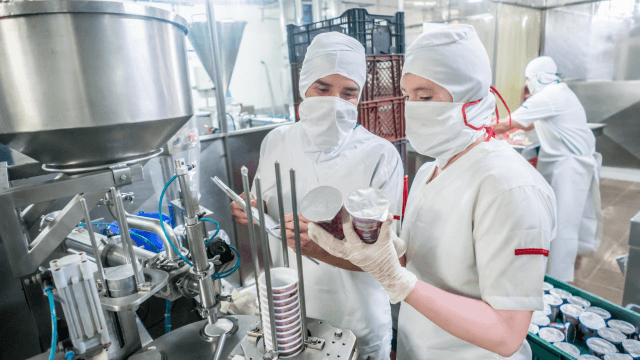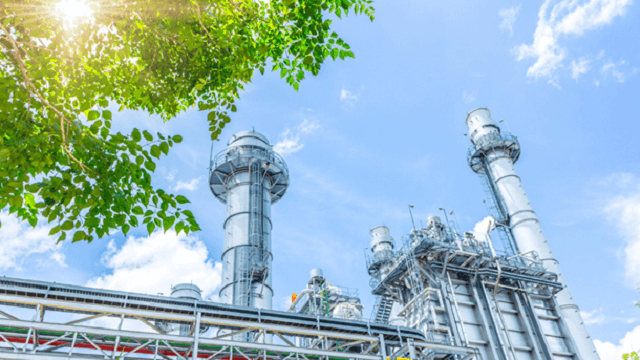A recipe for green: Insights into sustainability in Canadian food processing facilities
Sustainability has become an important goal for businesses across all sectors, and the food processing industry has been making great strides towards reducing its environmental impact while maintaining high standards of productivity and quality. Delve into the challenges faced by Canadian food processing plants and the changes they can embrace to pave the way for a greener future for this industry.
DATE 2024-07-16
Sustainability has become an important goal for businesses across all sectors, and the food processing industry has been making great strides towards reducing its environmental impact while maintaining high standards of productivity and quality.
In this blog, we’ll delve into the challenges faced by Canadian food processing plants and the changes they can embrace to pave the way for a greener future for this industry.
Mapping the green transition
How are Canadian industries investing and working towards sustainability goals? Find out in our eBook "Mapping the green transition: Benchmarking progress in Canada’s manufacturing and industrial sectors."

Who Did We Survey?
Of the food processing plants we interviewed, the majority (38%) were in Quebec, followed closely by Ontario (32%). British Columbia was next (16%), followed by Alberta (8%) and Manitoba and Saskatchewan (3% each). No respondents were from the Atlantic region.
In terms of job title, 22% held the title of Plant Manager, while Plant General Managers and Plant Operations Managers were tied at 16%. Maintenance Managers and Process Engineers were tied at 11%, and C-suite, Plant Maintenance Managers and Plant Engineering Managers all tied at 5%. Only 8% reported working as a Sustainability Director or Manager.

Food Processing Plants’ Sustainability Practices
Canadian food processing plants are on a promising trajectory toward sustainability, but there’s room for improvement: 70% of our respondents said they have sustainability goals in place, while 22% said they didn’t and 8% weren’t sure.
Of those with a plan in place, 69% said they were investing in new equipment, 62% are focusing on employee training, and 58% say they are optimizing their processes.
When we asked for more details on how these plants were optimizing their processes, they told us their focus was on the following:
- Other efficiency mentions – 20%
- Performing scheduled maintenance – 13%
- Monitoring/tracking work – 13%
- Focusing on improvement – 13%
- Energy efficiency/saving – 13%
- Efficiency in work – 13%
- Finding ways to be environmentally friendly – 13%
- Ensuring precision/accuracy – 13%
- Effective use of resources – 7%
- Reducing water consumption – 7%
- Other technology methods – 7%
- Reducing waste – 7%
- Reducing gas emissions – 7%
Strategies to Increase Sustainability
We then asked about the different sustainability strategies these plants were exploring. Overall, companies are investing in improving their energy efficiency (73%) and their waste reduction and recycling programs (62%). Investing in renewable energy resources and water conservation initiatives was also a priority (for 58% and 46%, respectively).
How else are respondents optimizing their processes?
Energy reducing programs
- 65% are reducing electrical energy consumption
- 62% are switching to renewable or less carbon-intensive energy sources
- 42% are reducing energy thermal consumption
- 31% are reclaiming waste thermal energy
Waste energy recovery
- 60% are recovering waste energy
- 27% are not recovering waste energy
- 14% aren’t sure how they’re recovering waste energy
Waste energy reuse
- 57% are reusing waste energy
- 32% are not reusing waste energy
- 11% aren’t sure how they’re reusing waste energy
Wastewater reclamation
- 65% are focusing on water reduction strategies
- 62% are focused on water reclamation for other parts of their business processes
- 54% are focusing on water recovery strategies
- 4% said other
- 4% said wastewater reclamation isn’t part of their sustainability goals
Alfa Laval hygienic pumps and valves
Using the right pump for your specific processing parameters can reduce energy consumption by as much as 50%.
Challenges and Barriers to Sustainability Goals
The food processing industry is one of the largest energy and water consumers in the manufacturing sector, and moving towards more sustainable practices is a challenge.
51% of our respondents said a lack of understanding of sustainable practices was their biggest hurdle to overcome, and 49% said financial constraints hindered their sustainability progress. 35% said technological limitations were holding them back, and 30% said regulatory compliance issues created a barrier to sustainability.
Alfa Laval can help food processing plants accelerate towards more efficient, cleaner energy solutions and reach sustainability goals, such as:
- Clean Energy
Alfa Laval helps our customers transition to cleaner energy with a wide range of advanced heat transfer and separation technologies including clean hydrogen, fuel cells, Power-to-X, biofuels, carbon capture, concentrated solar power and more. - Circular Economy
Thanks to our unique understanding of separation and thermal technologies, Alfa Laval has led the development of new solutions to advance the circular economy, helping optimize production processes for reliability and sustainability. - Energy Efficiency
At Alfa Laval, we have spent decades developing plate heat exchanger technologies that help food processing plants optimize energy use in their processes, and our unique thermal solutions make it possible to save dramatic amounts of energy. - Dairy Processing
From raw milk to finished dairy products, Alfa Laval components are designed to maximize yield, uptime, and product quality while minimizing power and water consumption. - Plant-based Protein Processing
With systems for whey treatment/water recovery and heat treatment, we’re a one-stop shop for sustainable processing lines that offer high yield and low operating expenses. - Food Processing
With solutions to ensure hygienic production and efficient cleaning-in-place of equipment and processing lines, Alfa Laval can help reduce energy consumption, recycle waste streams, and increase production yields. - Protein Processing
Alfa Laval remains at the forefront of sustainable protein production, with features like high resource efficiency and low energy consumption. We’re also actively involved in plant-based, cell-grown and fermented protein.
Move Closer to Your Sustainability Goals with Alfa Laval
Teaming up with Alfa Laval means you’ll have access to innovative solutions that will enable your food processing plant to increase production yields and decrease ingredient and product loss levels, all while reducing your utility consumption.
We’re proud to put our deep industry knowledge to work to optimize your customer processes while accelerating your transition to more efficient, cleaner energy solutions.
It’s good for business, for people and for the planet we all share.
To learn how Alfa Laval’s equipment and industry expertise can help maximize the sustainability of your food processing plant, contact our experts.
